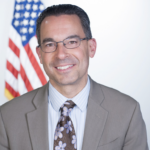EPISODE 207: “The Red Trickle: Where Do Our Elections Go From Here?” with Paul Teller PhD
To put it mildly, the expected massive Republican Red Wave in the recent 2022 midterm elections didn’t materialize. Even though 75% of Americans believe the country is on the wrong track, the election gave us status quo. Virtually every Governor, Senator and House incumbent won reelection. Trump states elected Republican Senators and Biden states elected Democrats. And despite House Republicans getting six million more votes than Democrats (52.3% compared to 46.2%), these votes did not translate into a surge of seats for Republicans. With more and more districts tightly gerrymandered, Democrat incumbents hung on if only by narrow margins. So what happened? Was it the issues, the money, the candidates, local factors, or something else? Joining me to explore this question, and where we go from here, is Paul Teller PhD, the Executive Director of Advancing American Freedom who served in the Trump White House as Special Assistant to the President for Legislative Affairs, and then as Director of Strategic Affairs for Vice President Mike Pence. Paul was also Chief of Staff for Senator Ted Cruz. Issues and candidates matter, but how we vote now may matter much more. The COVID lockdowns in 2020 provided the pretext of crisis to radically change American elections to mail-in and early voting, and in ways that now vary wildly state-by-state. Election Day is a thing of the past. Mail in ballots start coming in months earlier. Returns are not counted for days and ballots are both cast and counted under radically different and often suspicious conditions. “The reason in-person voting was always so important was someone else checks you in,” explains Paul. “A different person gives you a ballot, maybe a different person shows you how to in insert your ballot. Just different eyeballs. And so there’s less chance for fraud because there’s so many different kind of checks in the system.” The Democrats—with overwhelming media and money advantages—have mastered the arts of massive and unprecedented early, mail-in, and absentee voting. Democrats have far more control of the election machinery and almost total control of the American media and Republicans don’t. Still, Republicans seem bent on winning “hearts and minds” and on energizing their voters to show up on Election Day. But it is far easier to finesse and control the mail-in ballots than to “get out the vote.” Since the advent of massive ballot mail-in and collection drop-off processes, “votes” have become increasingly less valuable and “ballot collection” has become a key to Democrat party success. Case in point: In Pennsylvania, Oz drew 500,000 more voters to the polls on Election Day than Fetterman did. But Fetterman’s mail-in total exceeded 868,000, four times Oz’s mail-in total, netting a 655,000-vote difference in Fetterman’s favor. With boxes of ballots always seeming to show up at the last minute in close elections to push Democrat candidates into the win column, more and more American will likely never again trust our election results. There is an alternative. Same day voting. In person. With paper ballots. On a Sunday, or make it a national holiday. If Brazil can hold an election and on the same day get the results tabulated by 10 pm, we can too. Paul and I also talk about the great work Advancing American Freedom is doing and their Biden Accountably Tracker which monitors all the bills that Biden proposes, bills he signs, executive orders he issues, letters and directives the White House issues to the agencies, regulations they put out for comment and on and on … all the horribles of Biden’s bad policy choices. Elections matter.
SUBSCRIBE TODAY
FEATURED GUESTS
Related
Episodes

Episode 291: The Ministry of Green Truth: Mark Mills Exposes America’s $6 Trillion Energy Fantasy

Episode 290: Fifth Generation Warfare: Where Hypersonic Missiles Meet the Healthcare State
What if modern warfare has evolved beyond anything history’s great strategists could have imagined? While Metternich orchestrated the balance of power through diplomatic summits and Machiavelli counseled princes on maintaining state authority, today’s battles for sovereignty unfold in unlikely places: doctors’ offices, veterinary clinics, and local zoning boards across America.
Watch Now
Episode 289: The Bird and the (Babylon) Bee

Episode 288: The Secret Game: A Fast Break to Freedom


